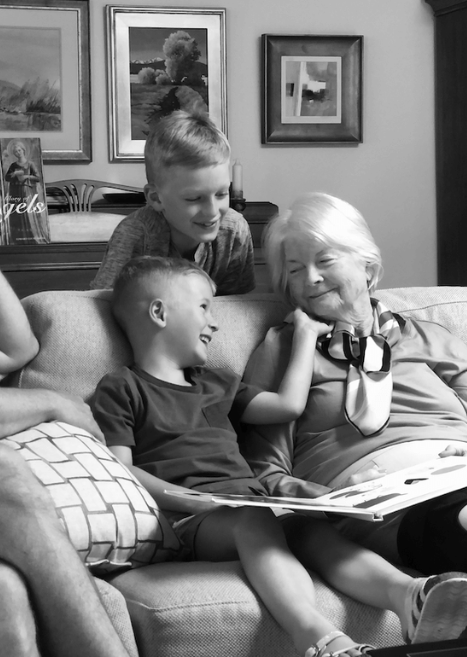Visiting elderly relatives can be daunting for children, especially if visits are sporadic. However, these visits are important for kids because it provides them with the opportunity to connect with family members they may not see very often and learn about their family's history. I remember as a child going to visit my great grandpa in a rest home. The experience was always scary to me. I thought his room smelled weird. And something about his hands were creepy, with pronounced veins and sunspots. I appreciate these things now. How those hands were rugged from years of manual labor as he supported my grandpa’s family.
My kids were very close with their ‘Granny’ - my mother-in-law. Unfortunately, she developed dementia in her early eighties and declined in mental health quickly. So quickly, that my children started having a difficult time understanding why their interactions with her were different than they were not too long before. Recognizing that she may not be around much longer, my husband and I made sure they visited their grandma weekly. But their enthusiasm to see her started waning. Most times she couldn’t remember their names. She had a difficult time understanding what they say (we all know kids talk quickly and quietly.) Increasingly, visits happened while she was lying in bed. It didn’t feel “normal” and so they weren’t excited to visit.
Now, we often take our 3 young children to visit their 90+ year old great-grandma. She is still so sharp of mind that I am shocked and delighted with every visit. However, her thick Finnish accent and constant adult topics create boredom for my young kids and they show it.
Feelings of apprehension or anticipation of boredom can prevent children from having meaningful moments with grandparents as they near the end of their lives. Here are a few tips on how you can help your kids prepare to visit a family member or loved one who is older or sick.
Teach your kids about proper etiquette, such as not interrupting when someone is speaking and being gentle when hugging or holding hands. Encourage your kids to ask questions, share stories, and be attentive listeners. You can also bring activities, such as games or books, to keep the visit interactive and engaging for both the kids and the elderly.
Visit often. A huge reason I didn’t like visiting my great grandpa was because it happened so infrequently. He seemed more like a stranger than a beloved family member. But the more you do something – create a routine – the easier it becomes. After all, routine is something familiar that you know you can do well.
Mentally prepare. Let your children know what to expect. Explain that their loved one may not look the same as they remember. Talk to them about some of things they may see, such as changes in breathing and skin color, weight loss. It’s also important to go over how long you plan to stay. Kids thrive in structure and I find mine are better behaved when they know what to expect.
Gather questions and stories. My kids never quite know what to talk about, so I guide them beforehand. We think of what happened this week that “Granny” would find funny. Or give them ideas on questions to ask her. During a recent visit in October, we had them ask her if she remembers her favorite Halloween costume or what her favorite candy was as a child and is currently.
Keep family in mind. No home is complete without at least a few pictures of your family. By paying homage to family members (and even ancestors) kids feel a connection to them on a daily basis as they see those images in your home.
Maintaining frequent communication and visiting with the older loved ones in our lives can benefit everyone involved. These interactions have been shown to slow cognitive problems and help seniors stay connected with your family. It will also help your children create connections and cherished memories with their older relatives.



